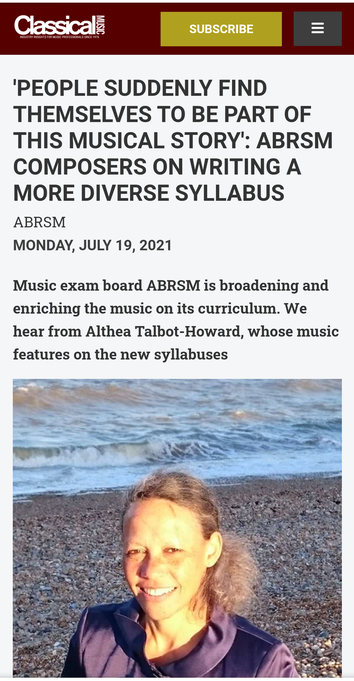
New generations of learners will be introduced to the inspirational music and stories of composers as varied as Joseph Bologne, Chevalier de Saint-Georges, the son of an 18th century slave and slave owner, and Brazilian Chiquinha Gonzaga, under an ABRSM drive to bring new richness to the world of music education.
The two composers are amongst dozens who have been selected to feature on ABRSM’s new 2022 woodwind syllabus as part of the charity’s commitment to inspiring progression by boosting the variety of music available to learners.
Composer Althea Talbot-Howard has written her own work for the syllabus but was also keen to arrange pieces by Joseph Bologne, Chevalier de Saint-Georges. Althea, who has realised movements of the Guadeloupe-born composer’s previously unpublished Sonata for Harp and Flute, said: 'Saint-Georges is an icon for many, but I grew up studying traditional classical music repertoire and did not realise there were composers of African origin.
'I submitted a range of possibilities from the Saint-Georges Sonata to ABRSM – from the early-grade Menuetto – to the more challenging Andante – in the hope that they might fit a pedagogical gap, somewhere in the woodwind syllabus. I wanted to present the work of an historical composer of African descent in addition to my own.'
The new syllabus covers flute, clarinet, saxophone, oboe, bassoon, and recorder. Other pieces featured include everything from a saxophone piece written by John Williams for the film ‘Catch Me If You Can’ and works by Vivaldi and Hans Zimmer but up to eight per cent of pieces for each instrument have been written or arranged by composers from a diverse range of backgrounds.
ABRSM initially researched and sourced almost 150 pieces by composers from under-represented groups for the new woodwind syllabus, with the process leading to contacts with dozens of composers and publishers new to ABRSM.
Diversification of the woodwind syllabus and the active commissioning programme are part of ABRSM ’s comprehensive new strategy to reflect greater diversity across all areas of its work and widen the pool of music available to learners.
Earlier this summer it also launched a mentoring programme designed to introduce young composers from a wider range of backgrounds to ABRSM’s specific technical requirements when it is commissioning music for education. ABRSM plans to make the programme an annual event which supports growing numbers of composers as it develops.
The cohort for the pilot edition, selected with help from The Ivors Academy, includes composers Shruthi Rajasekar, Su Ting Han, Kemal Yusuf, Kristina Arakelyan, James B. Wilson and Andrew Chen.
London-based Andrew, a recent Royal College of Music student, said: 'I don’t doubt that, growing up, lack of diversity amongst composers that I knew of in the immediate mainstream had an impact on my early perceptions. It wasn’t just the representation thing – there didn’t seem to be anyone around, living or young.
'Although I never perceived my ethnicity as a very tangible barrier, I know at the same time I was very lucky to have passionate musical mentors and people – family and teachers – who were invested in me. They provided a useful insulated space where I could be encouraged to do things, which, in other circumstances, might not have happened.'
Althea Talbot-Howard says the absence of Black role models did not impact on her music career, but experiences of racism did: 'My family emigrated from Britain to Australia when I was eight, shortly after the White Australia Policy ended in 1973. Music was a real refuge for me, and people thought I possessed talent. Whenever I experienced racial abuse at school and in the street, I came home and I did practise, practised hard, because in the Australian music world, I was respected.'
Althea adds: 'Music is a universal human endeavour, but it takes many forms. As the repertoire of classical music widens, it starts to reflect the universality of music as an artistic imperative in all cultures.
'ABRSM has now taken action by seeking out music of both artistic and pedagogical merit by a range of composers, some of whom are of African descent. I hope that everyone will be able to see the value in this exercise, and to celebrate the work that has been put in on the woodwind syllabus over the last year.'
She sees other practical benefits of making music from a wider range of backgrounds available to music learners, with inclusion of music by composers of African heritage like a ‘bridge’ for connecting with the new audiences that classical music today needs.
She said: 'Because many of the children and parents involved in music exams have a range of cultural influences in their lives, it is good psychology for classical music to meet them halfway, just as they are already meeting us halfway by involving themselves in what was once an exclusively-European endeavour.
'It’s also good manners. If an African family starts taking music lessons – as happened so often for me over the last 20 years, in my private teaching practice – it is wonderful to be able to say, "This composer was of African descent". It excites and inspires people, who, via the people who went before them, suddenly find themselves to be a part of this musical story.'
The two composers are amongst dozens who have been selected to feature on ABRSM’s new 2022 woodwind syllabus as part of the charity’s commitment to inspiring progression by boosting the variety of music available to learners.
Composer Althea Talbot-Howard has written her own work for the syllabus but was also keen to arrange pieces by Joseph Bologne, Chevalier de Saint-Georges. Althea, who has realised movements of the Guadeloupe-born composer’s previously unpublished Sonata for Harp and Flute, said: 'Saint-Georges is an icon for many, but I grew up studying traditional classical music repertoire and did not realise there were composers of African origin.
'I submitted a range of possibilities from the Saint-Georges Sonata to ABRSM – from the early-grade Menuetto – to the more challenging Andante – in the hope that they might fit a pedagogical gap, somewhere in the woodwind syllabus. I wanted to present the work of an historical composer of African descent in addition to my own.'
The new syllabus covers flute, clarinet, saxophone, oboe, bassoon, and recorder. Other pieces featured include everything from a saxophone piece written by John Williams for the film ‘Catch Me If You Can’ and works by Vivaldi and Hans Zimmer but up to eight per cent of pieces for each instrument have been written or arranged by composers from a diverse range of backgrounds.
ABRSM initially researched and sourced almost 150 pieces by composers from under-represented groups for the new woodwind syllabus, with the process leading to contacts with dozens of composers and publishers new to ABRSM.
Diversification of the woodwind syllabus and the active commissioning programme are part of ABRSM ’s comprehensive new strategy to reflect greater diversity across all areas of its work and widen the pool of music available to learners.
Earlier this summer it also launched a mentoring programme designed to introduce young composers from a wider range of backgrounds to ABRSM’s specific technical requirements when it is commissioning music for education. ABRSM plans to make the programme an annual event which supports growing numbers of composers as it develops.
The cohort for the pilot edition, selected with help from The Ivors Academy, includes composers Shruthi Rajasekar, Su Ting Han, Kemal Yusuf, Kristina Arakelyan, James B. Wilson and Andrew Chen.
London-based Andrew, a recent Royal College of Music student, said: 'I don’t doubt that, growing up, lack of diversity amongst composers that I knew of in the immediate mainstream had an impact on my early perceptions. It wasn’t just the representation thing – there didn’t seem to be anyone around, living or young.
'Although I never perceived my ethnicity as a very tangible barrier, I know at the same time I was very lucky to have passionate musical mentors and people – family and teachers – who were invested in me. They provided a useful insulated space where I could be encouraged to do things, which, in other circumstances, might not have happened.'
Althea Talbot-Howard says the absence of Black role models did not impact on her music career, but experiences of racism did: 'My family emigrated from Britain to Australia when I was eight, shortly after the White Australia Policy ended in 1973. Music was a real refuge for me, and people thought I possessed talent. Whenever I experienced racial abuse at school and in the street, I came home and I did practise, practised hard, because in the Australian music world, I was respected.'
Althea adds: 'Music is a universal human endeavour, but it takes many forms. As the repertoire of classical music widens, it starts to reflect the universality of music as an artistic imperative in all cultures.
'ABRSM has now taken action by seeking out music of both artistic and pedagogical merit by a range of composers, some of whom are of African descent. I hope that everyone will be able to see the value in this exercise, and to celebrate the work that has been put in on the woodwind syllabus over the last year.'
She sees other practical benefits of making music from a wider range of backgrounds available to music learners, with inclusion of music by composers of African heritage like a ‘bridge’ for connecting with the new audiences that classical music today needs.
She said: 'Because many of the children and parents involved in music exams have a range of cultural influences in their lives, it is good psychology for classical music to meet them halfway, just as they are already meeting us halfway by involving themselves in what was once an exclusively-European endeavour.
'It’s also good manners. If an African family starts taking music lessons – as happened so often for me over the last 20 years, in my private teaching practice – it is wonderful to be able to say, "This composer was of African descent". It excites and inspires people, who, via the people who went before them, suddenly find themselves to be a part of this musical story.'
ABRSM Announces Enriched Woodwind Syllabus Which Aims to Inspire Curiosity of Learners




